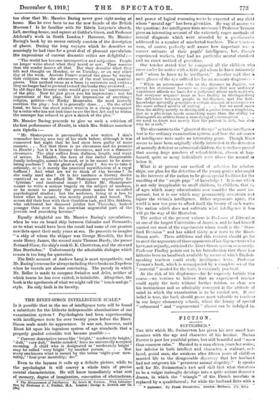THE BINET-SIMON INTELLIGENCE SCALE.* Is it possible that in the
use of intelligence tests will be found a substitute for the hitherto indispensable abominations of our
examination system ? Psychologists had been experimenting with intelligence tests for over twenty years before the Binet- Simon scale made its appearance. It was not, however, until Binet hit upon his ingenious system of age standards that a properly graded scientific test became possible :-
"Current descriptive terms like bright," moderately bright,'
dull," very dull,' feeble-minded,' have no universally accepted meaning. A child who is designated as moderately bright' may be called very bright' by another person. . . . But every one knows what is meant by the terms eight-year men- tality,' four-year mentality,' &c."
Even to the layman it calls up a definite picture, while to the psychologist it will convey a whole train of precise
mental characteristics. He will know immediately what sort of memory, degree of imagination, conception of abstractions,
• The Measurement of Intelligence, By Lewis M. Terman. With Introduc- tion by Professor J. J. Findlay. M.A. London : George S. Howlek and Co. (65.1 and power of logical reasoning are to be expected of any child whose "mental age" has been given him. By way of answer to the question : Are intelligence tests necessary ? Professor Terman gives an interesting account of the extremely vague methods of mental diagnosis which were revealed by a questionnaire
addressed to a number of unelected teachers. These teachers were, of course, perfectly well aware how important was a correct estimate of their pupils' intelligence, but, though experienced workers, they had no particular mental standard and no exact method of procedure.
One teacher stated that lie compared all the children who came under his notice with a little girl whom he knew intimately and " whom he knew to be intelligent." Another said that a mere glance of the eye sufficed her for an accurate diagnosis :--
" When an astronomer tells us the distance to Jupiter, we accept his statement because we recognize that our ordinary experience affords no basis for a judgment. about such matters, but everyone acquires more or less facility in distinguisliin4 the difference between people in intelligence, and the half- knowledge naturally generates a certain amount of resistance to the more refined matter of testing . . . but we need more than the ability merely to distinguish a genius from a simpleton, just as a physician needs something more than the ability to distinguish an athlete from a man dying of consumption . . . we need to know not merely that the patient is sick, but also why he is sick."
The alternative to the "glance of the eye" or to the intelligence test is the ordinary examination system, and here the advocates of intelligence tests make an interesting point. Though Binet
seems to have been originally chiefly interested in the detection of mentally deficient or subnormal children, the tests have proved
that among large numbers of schoolchildren-, chosen at hap- hazard, quite as many individuals were above the normal as
below it.
What is at present our method of selection for scholar.
ships, our plan for the detection of the young genius who ought in the interests of the nation to be given special facilities for the unrolling of the " ample page " of knowledge ? It is one which is not only inapplicable to small children, to children, that is, of ages which many educationists now consider the most ho. portant, but it is one which may permanently overstrain and injure the victim's intelligence. Other arguments apart, the world is now too poor to afford itself the luxury of such waste. The nation which does not cultivate what intelligence it has will go the way of the Mastolon.
The author of the present volume is Professor of Education at one of the largest Universities of America, and he had himself carried out most of the experiments whose result is the " Stan-
ford Revision " and has added thirty new tests to the Binet- Simon scale. These additions and this revision should go far to meet the arguments of those opponents of intelligence tests who have, not unjustly, criticized the Binet-Simon system so severely.
Professor Findlay points out in his Introduction that there has hitherto been no handbook available by means of which English- speaking teachers could study intelligence tests. Professor Terman's book, which is accompanied by a complete set of the
" material " needed for the tests, is extremely practical.
At the risk of his displeasure—for he expressly forbids this course—we venture to believe that an experienced teacher could apply the tests without further tuition, so clear are his instructions and so admirably conveyed is the attitude of mind in which the examination is to be carried out. if sax belief is true, the book should prove most valuable to teachers in our larger elementary schools, where the luxury of special " subnormal " and " supranormal " classes can be indulged in.














































 Previous page
Previous page